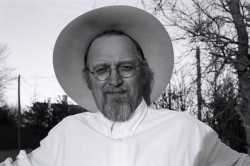An old man's bones know two things:
the dance changing weather makes
along the welds of ribs cracked
and fingers snapped in his youth,
each hairline fracture or clean break
stepping to the tune of changing
pressure, temperature and humidity;
and the past, all of it locked
in calcium surer than the brain
can hold it in its sudden and fading
little electrical storm. Sometimes
it's as if I am a young man standing
on a hill in wet grass watching
that storm recede, its lightning
a pulsing glow, thunder but an echo.
It's then I feel the cold and balmy
weathers that were my life and listen
to what my bones recall.
We gathered
LeeRoy and Verlena's cattle all of an afternoon
and the next morning, skinny cows, each hide
like a sack hung over a frame of bones,
and stunted calves, stupid in the heat. The wind
that had blown all summer like a scythe of fire
over the prairie had paused as if to savor the sale,
relaxing for a moment during a job well-started.
We dredged the pastures, animals fetlock-deep
in sand, feathers of dust rising from every hoof,
brought them together in the corrals at the rodeo
grounds, and sat our horses waiting. We chewed
to keep the spit in our mouths and passed a bottle
as much because there was nothing to say as the taste.
We faced southwest, the direction of summer storms,
but only the haze from our kicked-up dust
colored the horizon there. Even Lightfoot's
big buckskin Karl hung his head at the ends
of loose reins.
They started coming by the family
first, none of them with the cash or the grass
to take the cattle, just there as if in rehearsal
for what was sure to come in its time to them.
Wind-burnt men spat little puddles in the sand
between their feet, heads drooping like played-
out horses. Women stared into the sun, eyes
beneath stiff hands held parallel to the burning
land, looking after children in clothes frayed
and bleached as oat stubble. The auctioneer
showed, set up his PA, came over and, in the voice
an undertaker uses to greet mourners, told us
how it was going to be, and LeeRoy, whose consonants
had always been twisted and tied, gave
his short answers soft and clear. Calves cried
like sheep and cows bellowed. Buyers descended
from Omaha and Denver like vultures. The sale
started.
At first I thought it was the amplified voice
of the auctioneer that made Karl throw his head up
and his ears forward, until I noticed his nostrils
flaring and the dusty air funneling in and out
of his lungs. And I heard LeeRoy sucking air
through his mouth as if his body was a child's
balloon he was blowing up to four-hundred-pound
proportions. I saw him stiffen, his muscles
flex. I forced my eyes to the horizon where there
was only blue sky over a yellow prairie. The cattle
were milling in the pens, and there was something
running through the crowd I could hear beneath
the auctioneer. My horse wanted to curl around
and shifted her weight from leg to leg. It was then
I felt that first gust of breeze climb
the vertebrae under my shirt like chilled fingers
on a keyboard. I gave my horse her head,
and through the grit in my eyes I saw blue
thunderheads piling high to the north.
The sun
burned our eyes, and we tasted the sand in our mouths.
The storm held on the horizon, built and rolled.
The auctioneer stammered, started again and stopped.
Then LeeRoy was up on the platform, one hand knocking
the auctioneer away, the other plucking the mike.
"I smell it!" he said. “Dere ain't gohna be no sale!”
Verlena was off her horse staring at the rolling clouds,
her body braced as if against a board. We heard
the first thunder. The storm towered above us
in the heavens. The sun was gone as if someone
had passed a hand over it, and still there was no rain.
Lightfoot found a shotgun, fired into the sky.
The first drops hit so slowly I could count them,
each kicking up dust, settling into its little crater.
The rhythm quickened, and rain hammered my upturned face.
My tongue swelled with the wet of it, and my lips
moved as if to nurse. When I looked down
Verlena was standing, hatbrim sopping wet and hanging
over her eyes, shoulders slack, knees beginning to buckle.
Over the thunder and the crackle of the PA shorting out
I heard a shout and turned to see LeeRoy lift his bulk
from a standing start through the air and land both feet
square beside her. And there he was, thumbs and finger
tips meeting around her waist,
lift her high into the storm
as if she was his sun and he in orbit
around her. He circled and circled,
toe behind heel, turn,
toe behind heel, turn
her suspended form, eyes to eyes
across three feet of water and air,
until she found his head in her arms.
In her embrace they joined as one
figure in the sweeping sheets of rain.
Oh, my bones recollect more of that time,
the crack and splinter of corral boards
as spooked cattle broke for open land,
the crush of beef that sent my horse down,
the hom that hooked me and the hoof
that snapped my wrist, but the ache
that throbs there when rain approaches
is little more than a memory of blue clouds,
mud, and two people who waltzed in that weather.
